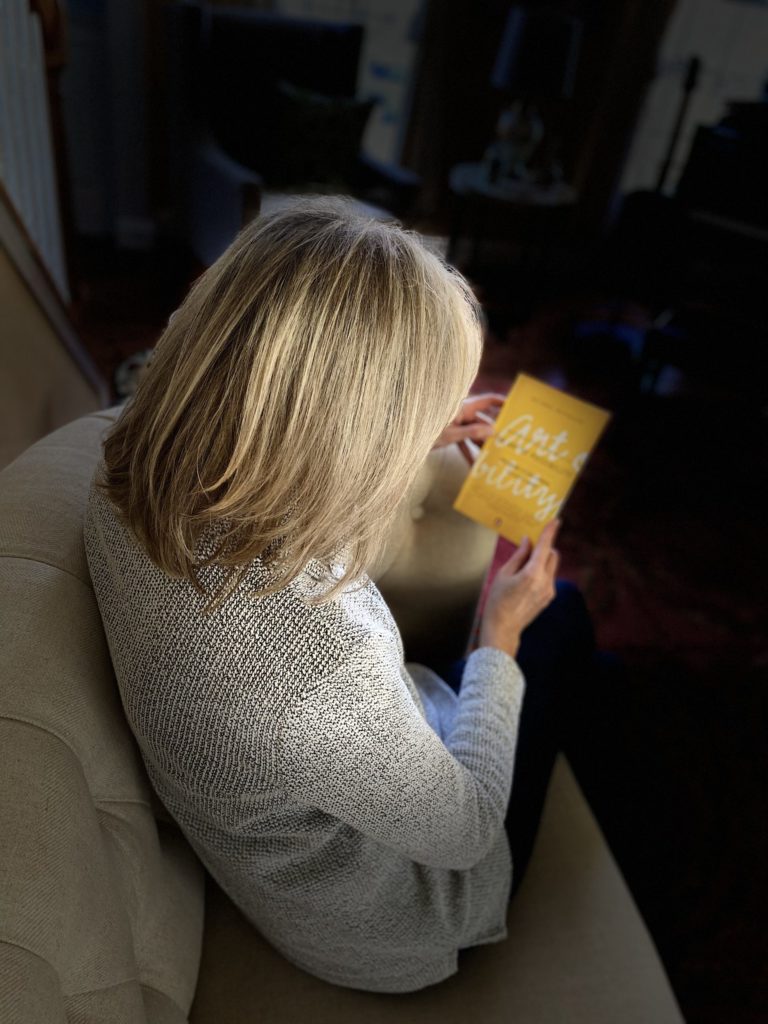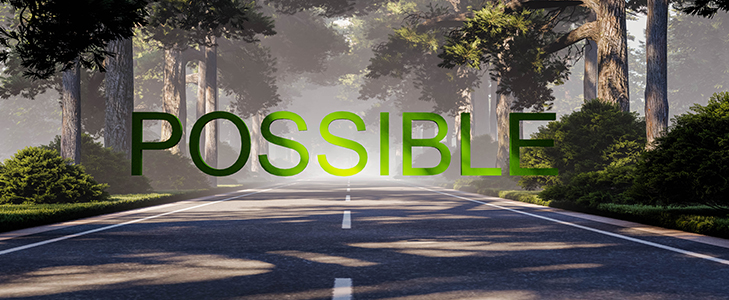By Mary De Luca, Vice President, Interact Communications

It’s March. Time to set our clocks forward, anticipate the first day of spring, and, with St. Pat’s Day upon us, contemplate how to conjure up a bit of Irish luck. While it certainly couldn’t hurt to find a pot of gold, you don’t need it. You have the power to make your own good fortune. It’s all about adopting “The Art of Possibility.”
That’s the “ah-ha” discovery I made one recent Saturday morning while enjoying a bit of down time and a frothy coconut milk latte at my local Barnes & Noble. I was leisurely strolling through the stacks when this sunny, yellow cover called out to me, promising some practical inspiration on a rather dreary day consumed with coronavirus coverage. About an hour later, I realized I’d read several chapters standing there as my now flat latte cooled on a shelf. I was mesmerized by the life-changing ideas shared by authors Benjamin Zander, conductor of the Boston Philharmonic, and Rosamund Stone Zander, family therapist and landscape painter.
The premise of what the Zanders espouse is to simply choose possibility. When we mindfully put this to practice, we can create new possibilities at work, at home, and in everything we do. Considering “possibility” is the essence of all we promise our students, I was intrigued—so much so, that I took the book home to finish reading that afternoon.
Here are some of the secrets the book shares that I hope will give you some ideas for how to shape our own serendipity.
1. We have the tools to define our own narratives. It’s our story to tell.
“It’s all invented anyway, so we might as well invent a story or a framework of meaning that enhances our quality of life and the life of those around us.”
As communicators and creative strategists, we shouldn’t have too much trouble with this idea. But, of course, we do, every time we box ourselves in with assumptions or unwanted conditions that confine us. The Zanders illustrate this point with the story of two marketing experts sent by a shoe factory to scout business in a remote region where they find people without shoes. The one sees this situation as “hopeless,” while the other sees it as a “glorious business opportunity.” Which story do you want to tell?
2. Let go of the world of measurement and step into a universe of possibility.
“You are more likely to be successful, overall, if you participate joyfully with projects and goals and do not think your life depends on achieving the mark because then you will be better able to connect to people all around you. On the whole, resources are likely to come to you in greater abundance when you are generous and inclusive and engage people in your passion for life.”
In our line of work, it can be easy to fall into the trap of listening to the doom and gloomers around the table, dwelling on such negatives as shrinking enrollment and a short supply of prospects. When we take the Zanders’ advice, we think bigger, realizing there are always new students out there who need us. What a joy it is that we can find them and share our passion for lifting people to better lives.
3. Give people A’s, and the possibilities open.
“The only grace you can have is the grace you can imagine. An A radiates possibility through a family, a workplace, and a community, gaining strength, bringing joy and expression and a flowing of talent and productivity.”
It can be easy to assign C’s or even lower grades to the people we work with, or who work for us, when we decide they don’t live up to our expectations. But the authors suggest we remember the hidden masterpiece Michelangelo envisioned within each block of marble he chiseled. Likewise, when we give people A’s, we free them from how they measure up and see them with a sense of respect with room to realize their potential. At the very least, this advice is a reminder to be more encouraging, to spend more time building positive relationships, and to be open to transformations. Again, isn’t that what we’re about anyway in this profession?
4. Instead of counting your successes and failures, declare yourself to be a contribution.
“Rewards in the contribution game are of a deep and enduring kind, though less predictable than the trio of money, fame, and power that accrue to the winner in the success game. You never know what they will be, or from whence they will come.”
In a world of “what have you done for me lately,” shifting our reality to focus on how we’re making a difference can be a struggle. But when we do, the rewards can be immense. Just think about the last time you were in a downward spiral and pulled yourself out of it by doing something for someone else. Think about approaching each day with how you’ll contribute instead of what you’ll accomplish. Refocusing your energy into ways you can make a difference will shift you to a hopeful frame of mind. At the end of the day, you will gain a sense of satisfaction about who you helped and how you helped instead of feeling disappointed over not checking every box on your to-do list.
5. Let go and participate wholly.
“Life flows when we put our attention on the larger patterns of which we are a part, just as the music soars when a performer distinguishes the notes whose impulse carries the music’s structure from those that are purely decorative.”
Music is the perfect metaphor for life, as Benjamin Zanders so artfully conveys with each anecdote from his global experiences conducting orchestras. We all learned the principle that the whole is greater than the sum of its parts. But it’s easy to get mired in the details and forget to enjoy our own performances. Taking a step back to see our part in the big picture also reminds us of how much we’re accomplishing together. It gives us a more celebratory perspective.
6. Adopt ‘Rule Number 6,’ which is to not take yourself too seriously.
“When we follow Rule Number 6 and lighten up over our childish demands and entitlements, we are instantly transported into a remarkable universe. For the most part it lies a bit above our heads. Angels can fly there because, as you may have heard, they take themselves lightly.”
In other words, lighten up. Just by doing so, you’ll feel lighter and be more inclined to soar. When I was leading the communications department at the Community College of Baltimore County, this was one of the core values my team defined for themselves. I think it may be the most important one to live out every day. The politics of opinion, pride, and inflated egos can get heavy. Being the one who can rise above this and show some compassion, and even better, a sense of humor, will lift the spirits of everyone. I am reminded of a favorite scene near the end of Moonstruck, one of my all-time favorite movies. The previously silent grandfather breaks the family’s uncomfortable silence at the kitchen table with, “Somebody tell a joke!”
So, back to that pot of gold…
These are just some of the insights I discovered in this little gem of a book. I find it especially timely in our era of negative 24/7 news cycles. It’s easy to feel we have little to no control over what happens to us and that we have to rely on luck to survive.
But who needs luck when you’ve got possibility?

If you would like to take a peek at this gem for yourself, use the link below to get your own copy.



